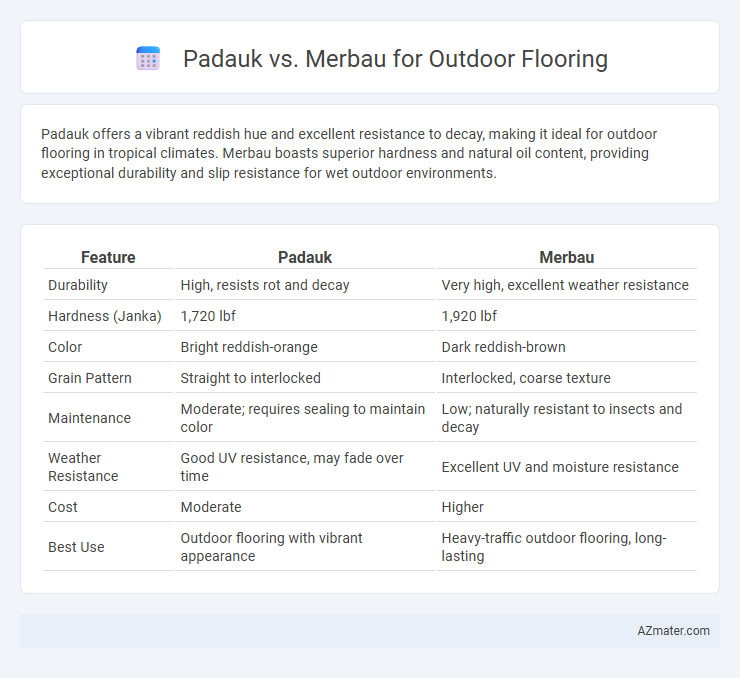Padauk offers a vibrant reddish hue and excellent resistance to decay, making it ideal for outdoor flooring in tropical climates. Merbau boasts superior hardness and natural oil content, providing exceptional durability and slip resistance for wet outdoor environments.
Table of Comparison
| Feature | Padauk | Merbau |
|---|---|---|
| Durability | High, resists rot and decay | Very high, excellent weather resistance |
| Hardness (Janka) | 1,720 lbf | 1,920 lbf |
| Color | Bright reddish-orange | Dark reddish-brown |
| Grain Pattern | Straight to interlocked | Interlocked, coarse texture |
| Maintenance | Moderate; requires sealing to maintain color | Low; naturally resistant to insects and decay |
| Weather Resistance | Good UV resistance, may fade over time | Excellent UV and moisture resistance |
| Cost | Moderate | Higher |
| Best Use | Outdoor flooring with vibrant appearance | Heavy-traffic outdoor flooring, long-lasting |
Introduction to Padauk and Merbau Wood
Padauk wood, known for its vibrant reddish-orange color and exceptional durability, is a popular choice for outdoor flooring due to its resistance to decay and insect attacks. Merbau wood features a rich brown hue with interlocking grain, offering high density and natural oils that enhance its weather resistance and longevity in exterior applications. Both woods provide excellent hardness and stability, making them ideal for long-lasting, aesthetically pleasing outdoor decking solutions.
Key Characteristics of Padauk Wood
Padauk wood is known for its rich, vibrant reddish-orange hue that naturally darkens over time, offering a visually striking outdoor flooring option. Its high density and natural resistance to decay and insect attack make it exceptionally durable in outdoor environments. The wood's fine, interlocking grain structure enhances stability and minimizes warping, ensuring long-lasting performance in various weather conditions.
Defining Features of Merbau Wood
Merbau wood, known scientifically as Intsia bijuga, is prized for its exceptional durability and natural resistance to rot, termites, and fungi, making it ideal for outdoor flooring applications. Its rich reddish-brown color deepens over time, complemented by a coarse, interlocked grain that provides excellent slip resistance, an essential safety feature for exterior surfaces. High oil content in Merbau enhances its weather resistance and longevity, often outperforming Padauk in harsh outdoor environments.
Durability Comparison: Padauk vs Merbau
Padauk and Merbau are both highly durable hardwoods commonly used for outdoor flooring, with Merbau exhibiting superior resistance to moisture, insects, and fungal decay due to its dense natural oils. Padauk offers excellent hardness and stability but tends to weather faster under constant exposure to sunlight and rain, leading to gradual color fading and surface wear. For long-term outdoor applications requiring maximum durability and minimal maintenance, Merbau is often preferred, while Padauk may be chosen for its vivid color and moderate durability in less harsh conditions.
Weather Resistance for Outdoor Use
Padauk offers excellent weather resistance with natural oils that repel moisture and resist decay, making it suitable for harsh outdoor conditions. Merbau is highly durable and resistant to fungal attacks and termites, with a dense grain that withstands heavy rainfall and UV exposure. Both woods excel in weather resistance, but Padauk's vibrant color may fade faster, while Merbau maintains a more stable appearance over time.
Color and Visual Appeal Differences
Padauk wood showcases a vibrant reddish-orange hue that deepens to a rich, warm red with exposure, offering a striking and lively visual appeal for outdoor flooring. Merbau features a darker, brownish color with subtle reddish undertones and natural grain patterns, providing a more subdued yet elegant aesthetic. The choice between Padauk and Merbau depends on the desired brightness and warmth in outdoor spaces, with Padauk delivering more vivid color contrasts and Merbau offering a classic, earthy tone.
Maintenance and Longevity Considerations
Padauk offers excellent resistance to decay and insect attacks, making it a durable choice for outdoor flooring with relatively low maintenance requirements, typically needing periodic cleaning and oiling to preserve its vibrant reddish hue. Merbau is renowned for its exceptional hardness and high natural oil content, which enhances its resistance to moisture and fungal decay, resulting in long-lasting outdoor floors that require less frequent sealing but benefit from occasional deep cleaning to maintain their integrity. Both woods provide impressive longevity, but Merbau's denser grain and oils generally offer superior weather resistance, reducing the frequency of maintenance interventions compared to Padauk in harsh outdoor environments.
Cost Comparison: Padauk vs Merbau Flooring
Padauk flooring generally costs between $8 to $12 per square foot, while Merbau prices range from $7 to $11 per square foot, making Merbau the more budget-friendly option for outdoor use. Both hardwoods offer excellent durability, but Merbau's lower average price and resistance to moisture often provide better value for large-scale outdoor projects. Price variations depend on sourcing, grade, and thickness, with imported Padauk typically commanding a higher premium due to its vivid color and scarcity.
Sustainability and Environmental Impact
Padauk offers a more sustainable choice for outdoor flooring due to its faster growth rate and wider availability, reducing deforestation pressure compared to Merbau. Merbau, while highly durable and resistant to weathering, is often harvested from slower-growing tropical hardwood forests, raising concerns about habitat loss and illegal logging. Selecting FSC-certified Padauk ensures reduced environmental impact and supports responsible forestry practices in outdoor flooring projects.
Final Recommendation: Best Choice for Outdoor Flooring
Padauk offers vibrant reddish hues, excellent durability, and natural resistance to moisture and decay, making it a strong candidate for outdoor flooring surfaces. Merbau, known for its dense grain structure and superior hardness, provides exceptional resistance to wear, termites, and weather conditions, ensuring long-lasting performance. Given its blend of hardness, natural oils, and proven endurance in diverse climates, Merbau stands out as the best choice for outdoor flooring applications.

Infographic: Padauk vs Merbau for Outdoor Flooring
 azmater.com
azmater.com